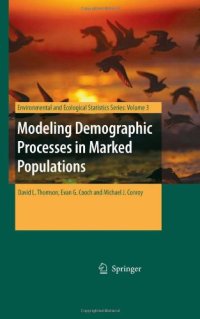
Ebook: Modeling Demographic Processes In Marked Populations
- Genre: Art // Graphic Arts
- Tags: Statistics for Life Sciences Medicine Health Sciences, Math. Appl. in Environmental Science, Nature Conservation
- Series: Environmental and Ecological Statistics 3
- Year: 2009
- Publisher: Springer US
- Edition: 1
- Language: English
- pdf
Much of biology can be understood in terms of demography. It is the demographic processes of birth and death which govern rates of population growth and the rates at which gene frequencies change. The analysis of demographic processes in free-living organisms is, however, far from simple. Scientists from diverse fields in biology and statistics have united to address the challenges by developing mark-recapture methods and other approaches. Progress has been rapid, and this volume represents a snapshot of the emerging field. It has eleven sections in total, covering the most important biological and statistical frontiers, new software developments, and an open forum. It covers the latest approaches in modeling population dynamics, evolutionary ecology and wildlife biology. It addresses issues in the estimation of abundance and movement, and it covers new statistical approaches in the combination of information, Bayesian statistics, Robust Designs and the modeling of state-uncertainty.
This book brings together biologists and statisticians in an interdisciplinary synthesis to develop new methods to overcome the most significant challenges and constraints faced by quantitative biologists seeking to model demographic rates. The book is centered on the ten key areas in the field where important problems in demographic analysis are being solved with new statistical methods. Each area presents one overview written by an acknowledged expert in this field, and four original research contributions. The 10 key areas are: - Abundance estimation; direct, proxies and point counts; Population dynamics; - Combining sources of information; - Dispersal movement and migration; - State uncertainty: assignment error and unobservable states; - Robust design: sampling, applications and advances; - Bayesian applications: advances, random effects and hierarchical models; - Evolutionary ecology; - Wildlife and conservation management; - Software developments for the modelling of demographic rates in marked populations.